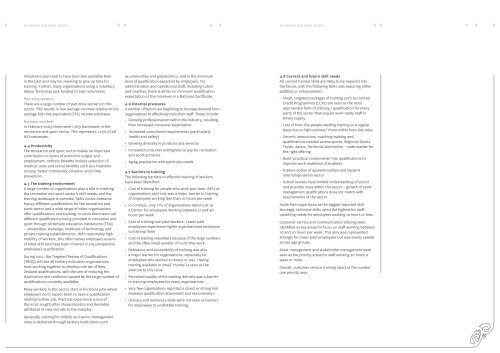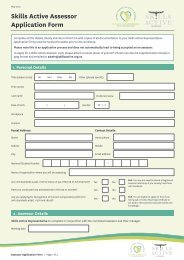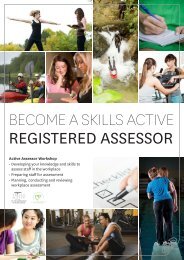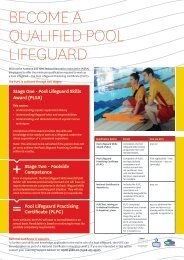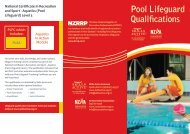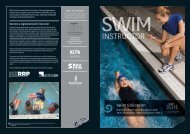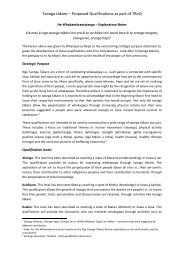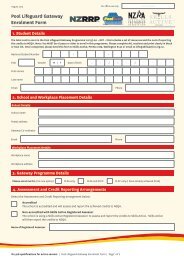Skills Active Aotearoa Sector Strategic Training Plan 2012-2015
Skills Active Aotearoa Sector Strategic Training Plan 2012-2015
Skills Active Aotearoa Sector Strategic Training Plan 2012-2015
Create successful ePaper yourself
Turn your PDF publications into a flip-book with our unique Google optimized e-Paper software.
ecreation and sport sector16 recreation and sport sector17Volunteers also tend to have less time available thanin the past and may be unwilling to give up time fortraining. Further, many organisations using a voluntarylabour force may lack funding to train volunteers.Part-time workersThere are a large number of part-time workers in thissector. This results in low average incomes relative to theaverage full-time equivalent (FTE) income estimates.Business numbersIn February 2009 there were 1,679 businesses in therecreation and sport sector. This represents 1.13% of allNZ businesses.4.4 ProductivityThe recreation and sport sector makes an importantcontribution in terms of economic output andemployment. Indirect benefits include reduction ofmedical costs and social benefits such as a healthiersociety, better community cohesion and crimeprevention.4.5 The training environmentA large number of organisations play a role in meetingthe recreation and sport sector’s skill needs, and thetraining landscape is complex. <strong>Skills</strong> <strong>Active</strong> <strong>Aotearoa</strong>has 45 different qualifications for the recreation andsport sector and a wide range of other organisationsoffer qualifications and training. In 2008 there were 146different qualifications being provided in recreation andsport through 68 tertiary education institutions (TEIs)− universities, wananga, institutes of technology andprivate training establishments. With reasonably highmobility of workers, this often leaves employers unsureof what skill sets have been covered in any prospectiveemployee’s qualification.During <strong>2012</strong>, the Targeted Review of Qualifications(TROQ) will see all tertiary education organisationsstart working together to develop one set of NewZealand qualifications, with the aim of reducing theduplication and confusion caused by the large number ofqualifications currently available.Many workers in this sector start in front-line jobs whereemployers don’t expect them to have a qualificationrelating to their job. Practical experience is one ofthe most sought-after characteristics and desirableattributes of new recruits to the industry.Generally, training for middle and senior managementroles is delivered through tertiary institutions suchas universities and polytechnics, and is the minimumlevel of qualification expected by employers. Foradministration and operational staff, including tutorsand coaches, there is either no minimum qualificationexpectation or the minimum is a National Certificate.4.6 External pressuresA number of factors are beginning to increase demand fromorganisations to effectively train their staff. These include:• Growing professionalism within the industry, resultingfrom increased consumer expectation• Increased compliance requirements (particularlyhealth and safety)• Growing diversity in products and services• Increased consumer willingness to pay for recreationand sport activities• Aging population with particular needs.4.7 Barriers to trainingThe following barriers to effective training of workershave been identified:• Cost of training for people who work part time. 66% oforganisations said cost was a major barrier to trainingof employees working less than 10 hours per week• In contrast, only 21% of organisations rated cost asa barrier for employees working between 31 and 40hours per week• Cost of training low-paid workers. Lower paidemployees experience higher organisational resistanceto training them• Cost of training volunteers because of the large numbersand the often small number of hours they work• Relevance and accessibility of training was alsoa major barrier for organisations, especially foremployees who worked 20 hours or less. Havingtraining available in small ‘chunks’ is seen as thesolution to this issue• Perceived quality of the training delivery was a barrierto training employees for many organisations• Very few organisations reported a direct or strong linkbetween qualification attainment and remuneration.• Literacy and numeracy skills were not seen as barriersfor employees to undertake training.4.8 Current and future skill needsAll current trained skills are likely to be required intothe future, with the following skills sets requiring eitheraddition or enhancement:• Small, targeted packages of training such as LimitedCredit Programmes (LCPs) are seen as the mostappropriate form of training / qualification for manyparts of the sector that require work-ready staff intimely supply• Lots of front-line people needing training on a regularbasis due to high turnover/ churn within front-line roles• Generic instruction/ coaching training andqualifications needed across sports, Regional SportsTrusts, dance, Territorial Authorities – wide market forthe right offering• Build ‘practical components’ into qualifications toimprove work readiness of students• Explore option of apprenticeships and studentinternships within sector• School leavers have limited understanding of sectorand possible roles within the sector – growth of sportmanagement qualifications does not match withrequirements of the sectorAside from experience as the biggest reported skillshortage, technical skills rated the highest for staffupskilling needs for employees working 10 hours or less.Customer service and communication training wereidentified as key areas for focus on staff working between10 and 20 hours per week. This also was representedstrongly for lower-paid employees but was evenly spreadacross age groups.Asset management and stakeholder management wereseen as the priority areas for staff working 20 hours aweek or more.Overall, customer service training rated as the numberone priority area.


